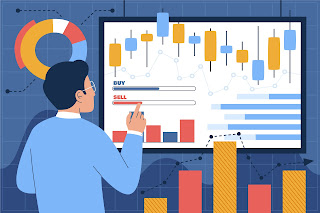How investment is different from trading?
Everyone is looking for a profitable way to earn a living, and a lot of
people opt to trade. It's one of the most popular ways to earn a living
online. You buy low, sell high, and repeat the process. You can trade in
almost anything regardless of the asset class or the complexity of the
asset.
What do you mean by investment?
Investment is the process of putting money into something that will provide returns, ultimately. An investment is a financial asset or item that you can use, sell or exchange in the future, such as a stock, bond, and other investment. An investment can be held for a long time or a short time. When you buy an investment, you are buying a portion of a company and holding it for the future. If you sell the investment, you make a profit. Investors make money by buying low and selling high.
What do you mean by trading?
A trader is someone who holds onto a position for a relatively short time period with the goal of making a profit from the price difference. Trading is the act of buying and selling financial instruments ranging from stocks and bonds to futures and commodities in the hope of making a profit on the price difference. Trading is the act of buying and selling financial instruments, such as stocks, options, futures, and foreign exchange. The main difference between trading and investing is that trading is done for the purpose of generating profit on the short-term fluctuations of a security’s price. Investors may also trade in order to realize some capital gain, but their focus is on the long-term appreciation of the asset. Traders hire share market advisory company for trading recommendations and advice.
Difference between investment and trading
Investment and trading are two different concepts. So it is very important to understand the differences between these two. Trading is a process of buying and selling financial instruments (stocks, bonds, futures, commodities, etc.) in the hope of making a profit from the difference in the price at which the trade is entered and the price at which it is closed. Investing is a process of buying an asset in the hope of generating income from its appreciation over a certain period of time, or its expected use in the future. In short, investment is a broader term that includes trading, but trading is a subset of investment.
Importance of Trading and Investment
The importance of trading and investment for the stock market cannot be underestimated, as much as people like to think it is a pure numbers game, trading is always more about the psychology behind it and the information that traders can get that can affect the market, and the trading in the market. The importance of trading and investment for the market is that it decides the supply and demand in the market. It is the reason why the market is able to go up and down.
Conclusion
Trading stocks, or stock market trading, is the process of buying and selling stocks on a daily or weekly basis, which can make you a lot of money if you know what you're doing. It also has the potential to make you go broke if you don't know what you're doing. However, trading and investment can be quite difficult if you don't know what you are doing, which is why you should look into trading and investment courses or best SEBI registered stock advisory company.





Comments
Post a Comment